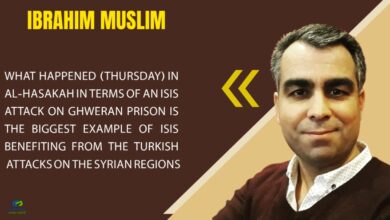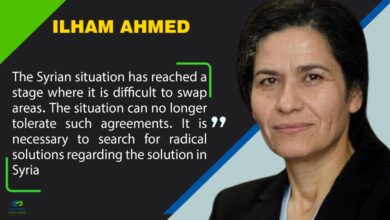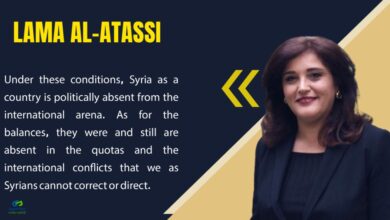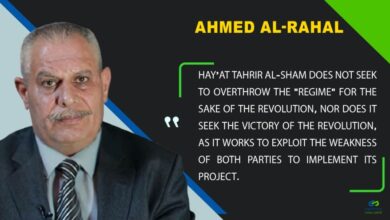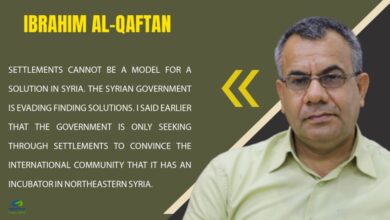George Sabra to Ugarit: The year 2022 is the worst year for the Syrians.. and the coming period will be more difficult in the various areas of control
The Syrian crisis is approaching the end of its 11th year, leaving political, economic, and social impacts, as estimates vary about the extent of the losses the country has paid in all fields, and the repercussions of this on the future of the Syrians.
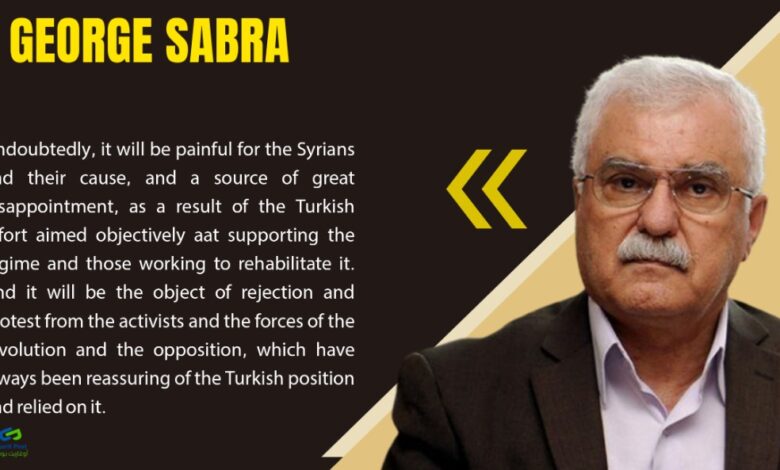
During a private dialogue with the former President of the Syrian National Council, George Sabra, the “Ugarit Post” network raised many questions about reading the Syrian crisis in light of the developments and events that took place in 2022, and the efforts of rapprochement between the Syrian government and Turkey, and whether this could contribute to resolving the crisis.
How can the crisis in Syria be read in light of the developments and events that took place in 2022?
The Ukrainian war has hijacked the spotlight on the Syrian situation, and confiscated international and regional attention. It also contributed to the exit of the official institutions of the forces opposing the revolution from the circle of concern and action, and thus the Syrian issue was removed from the spotlight and placed on the shelf of internationally deferred issues. The political process remained absent in Geneva, leaving its functioning and future unknown. Even the Astana-Sochi track and even the “Constitutional Committee” were unable to start work and continue meetings and talks that lacked the necessary seriousness. Refugee conditions also deteriorated. Then the state of decline and lack of interest in the Syrian issue extended to the international humanitarian and relief conditions provided by the United Nations, its specialized agencies and charitable organizations. In short, the year 2022 was the worst year in the life and cause of the Syrians since the beginning of the revolution.
The Syrian economy has collapsed dramatically in the year 2022, and the citizen has become living in a difficult situation in very harsh conditions.. What are the reasons for that, and do you think there are solutions to save the economy?
When the regime’s interest is focused on providing the reasons for its continuation only, in any form and at any cost. And when the goal of the local authorities and those who lead them in other places is determined to strengthen their presence, role and tasks in securing the interests of foreign countries. And when the efforts of the intervening countries are focused on protecting the regime and rehabilitating it at the expense of the capabilities of Syria and its people, it becomes natural for the situation to reach what it is today.
The collapse of the national currency and the dollar has reached seven thousand Syrian pounds in all regions of the country. Real productive economic activity, agricultural, industrial and commercial, has been disrupted in favor of the drug industry and smuggling. The health and education sectors have been disrupted, and 90% of Syrians are below the poverty line, 80% of whom lack food security, according to official United Nations statistics. In such a situation, the authorities – concerned with implementing the will of states and enabling their authorities to continue – will not be able to provide solutions to the disasters caused by the authority. Therefore, the coming period seems more difficult for the Syrians in the various regions of their presence.
In conjunction with the talk about the Syrian solution, there are efforts for rapprochement between the government of Damascus and Turkey. How do you read this development, and can it contribute to resolving the crisis?
Obviously, it is more than a matter of closeness, It is a path that began some time ago, and the Russian leadership plays a pivotal role in facilitating its steps, to achieve what it was unable to do through its proposals for “reconstruction” by Europe, and the “return of refugees” regionally and through the League of Arab States, which is to rehabilitate the regime. Today, it hopes to achieve this through Turkey, which enjoys more effective conditions and capabilities in terms of geopolitical and human terms than all aspirants for such a role in the region.
Undoubtedly, it will be painful for the Syrians and their cause, and a source of great disappointment, as a result of the Turkish effort aimed objectively at supporting the regime and those working to rehabilitate it. And it will be the object of rejection and protest from the activists and the forces of the revolution and the opposition, which have always been reassuring of the Turkish position and relied on it.
Paradoxically, this Turkish turn comes in conjunction with the rising voice of the popular protests at home and in areas controlled by the regime, which are increasing and expanding. This indicates that the reasons for the explosion of the situation and the continuation of the revolution still exist to achieve freedom and dignity for the Syrians and to achieve national democratic change in the life of the country.
How do you see the future of Idlib, As-Suwayda, and the east of the Euphrates during the year 2023?
It is not easy to read the course of events and their results in light of the ongoing great struggles and the possibility of latent and explosive wars. Especially in places of intense conflict, as it is taking place, and the presence of a capable international hand in it. Deals and mutual interests and the realization of the goals of small and large are the master of the situation. However, the indicators of the situation in As-Suwayda indicate that the will of the people in this province through the organized and continuous protests, which move from slogans of economic and social demands to political demands and the Syrian national space (here As-Suwayda…here Syria) constitute a new tributary of the tributaries of the revolution. In addition to field events in Daraa Governorate.
What are your expectations for 2023?
It is not difficult to expect the continuation of the uprising in As-Suwayda and its escalation in the regime of its national and revolutionary demands against the regime, and it has made great strides in this regard. The same applies to Daraa and its towns such as Jasim, Dael, Tal Shihab, Muzayrib, As-Sanamayn, Ghabagheb and others.
I believe that the time has come to end the state of scattering and division within the forces of the revolution and the opposition and between activists and the national political and cultural elites, to begin their efforts to build a political body worthy of representing the revolution, upholding its goals, preserving the independent national decision, and working for a political solution in accordance with international resolutions and respecting the will and sacrifices of the people.

